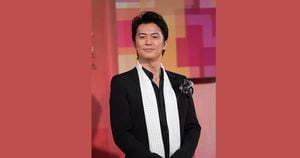Ben Shelton's recent experience at the 2025 Australian Open has ignited controversy surrounding the treatment of players by broadcasters and interviewers during post-match interviews. Following his semifinal defeat to Jannik Sinner, Shelton openly criticized the negative tone of questions posed to players, calling for more respect and consideration during these pivotal moments.
The excitement around Shelton's semifinal against the world No. 1, Jannik Sinner, was palpable, especially as the players took to Rod Laver Arena on January 24. With much at stake, Sinner prevailed with scores of 7-6 (7-2), 6-2, showcasing his prowess on court. This win advanced Sinner to the finals where he would face Alexander Zverev, who had reached this stage after Novak Djokovic retired injured.
Despite the glamour of the tournament, Shelton's focus shifted to the disheartening interactions he and others had experienced with media personnel. Notably, during his initial post-match press conference, he stated, "I've been a little bit shocked this week with how players have been treated by the broadcasters. I feel like broadcasters should be helping us grow our sport and help these athletes who just won matches on the biggest stage enjoy one of their biggest moments." The 21-year-old American didn't hold back as he spoke about the negativity pervasive within the post-match interviews.
His critique came after specific incidents where both he and his fellow athletes received pointed questions. For example, one reporter had asked Shelton about the crowd's potential favouritism, stating, "you know no one is going to be cheering for you?" Shelton critiqued the framing of such interactions, pointing out, "I just don’t think the comment is respectful from a guy I’ve never met before in my life." This sentiment was echoed by tennis legends Boris Becker and Chris Evert, who took to social media to express their agreement with Shelton's criticism.
The pressure players face on and off the court is immense, and the dynamics of media interactions can greatly influence their mental and emotional states. After Iga Swiatek’s heartbreaking loss to Madison Keys, the treatment she faced during her post-match conference raised eyebrows as well. When asked, "How much does it hurt inside to miss a match point, miss making a first final here and miss the chance to become World No.1 again?" Swiatek’s reaction was one of dismay, replying, "You have to experience it to know." This response highlighted similar concerns about the insensitivity of questions posed to athletes when they are at their most vulnerable.
Responses from the public and fellow commentators on social media show a growing displeasure with the media's approach toward player interviews. A notable discourse erupted after Shelton’s comments, with various social media users supporting his position and calling for more sensible interviews. The tweets ranged from direct endorsements of Shelton's remarks to criticisms of the specific interviewers. Fans and analysts alike seem to resonate with the idea of fostering a supportive environment for athletes, especially amid high-pressure competitive settings.
Becker remarked on social media, "Absolutely agree with Ben! Courtside interviews way too long after matches...and too personal as well!" Evert also noted, "I agree with Ben. Sometimes on-court interviewers try to be funny or make it about themselves…. Jim Courier is excellent in this role…" There is consensus among some of tennis's biggest names advocating for constructive dialogues with athletes instead of speculative questioning.
For many fans, the Australian Open is not just about the matches but also about the players' experiences and growth. The tournament organizers, Tennis Australia, have yet to respond to the criticism, which leaves many wondering how the media might adapt to this feedback moving forward.
While on-court interviews have the potential to add levity to the tournament atmosphere, the balance between entertainment and respect for athletes must be navigated carefully. This incident could serve as a turning point for how player interactions are approached, promoting enhanced respect and responsibility among interviewers.
Only time will tell how this development impacts future tournaments and the treatment of athletes by media personnel. Shelton’s brave stand may contribute to necessary changes for promoting player welfare and sportsmanship at prestigious events like the Australian Open.



